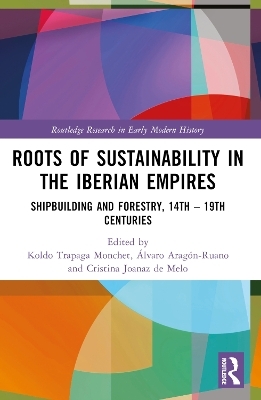
Roots of Sustainability in the Iberian Empires
Routledge (Verlag)
978-1-032-31338-2 (ISBN)
This book sheds light on the roots of sustainability in the Iberian Peninsula that lie in the interrelations between shipbuilding and forestry from the 14th to the 19th centuries, combining various geographical scales (local, regional and national) and different timespans (short-term and long-term studies).
Three main themes are discussed in depth here: firstly, the roots of current conservationism in the Iberian Peninsula; the evolution of the forest policies set in motion at local, regional and national levels to meet the demand for wood and timber; and the long-standing impact of naval empirical forestry on the conservation and transformation of the forest landscape. Therefore, the book attempts, on the one hand, to unravel the forest policies and empirical forestry implemented in the Iberian Peninsula as the roots or origins of what we refer to nowadays as "sustainability", and to assess the contribution of imperial forestry to landscape planning and the conservation of forest resources, on the other, and, finally, to break away from the prevailing theological narrative that shipbuilding was the main agent of forest destruction in the early modern Iberian Peninsula, for which both quantitative and qualitative analyses will be conducted.
This book will be of key interest to environmental and social historians and researchers, and to anyone devoted to conducting research on the emergence and evolution of the concept of "sustainability" with respect to the governance and the historical transformation of woodlands around the world.
Koldo Trapaga Monchet is currently an Associate Professor of Early Modern History at King Juan Carlos University. His two main research lines revolve around the politics and governance of the royal forests and woodlands in the Iberian Peninsula from the 15th to the 17th centuries, especially in regard to shipbuilding, and the study of the political performance and the royal households of Don Juan José de Austria in the Hispanic Monarchy. Alvaro Aragón Ruano took his degree in History at the University of Deusto (1992) and later moved to the University of the Basque Country, where he is currently acting as Aggregate Professor, obtaining his PhD by means of research into woodland in Guipúzcoa during the Early Modern era. Since then, he has spent over 20 years analyzing different aspects of Basque forest history. Nowadays he is focused on Basque-Navarrese woodlands’ historical management and sustainability during the Medieval and Early Modern eras. Cristina Joanaz de Melo is Integrated Researcher at Universidade NOVA de Lisboa (IHC-Lab:in2past) and Invited Professor at Universidade Autónoma de Lisboa, teaching a course on "Environmental History". She is founding member of the Portuguese Network of Environmental History (REPORTHA 2015). Her PhD, on Hydrological and Forestry Policies in Portugal (and Southern Europe), 1830s to 1880s, was taken at the European University Institute (Florence, 2010). Working and publishing on natural resources, hunting and forests since the 1990s, her current interests lie in natural resource recovery, renewal and compensation due to human agency, from the 1400s to the 1800s, across the Iberian Peninsula and naval empires.
1. The global timber trade and shipbuilding in the 16th-18th centuries: interdisciplinarity, research problems and the ForSEAdiscovery project / 2. Durable Forests in a Tensile State: Intensive and Extensive Approaches to Naval Forestry in Early Modern Spain / 3. Empirical silviculture and sustainability in the Basque Country during the Early Modern Period / 4. The sustainability of forests for shipbuilding. A historical-archaeological view of Biscayan shipbuilding and its forestry tradition in the 16th-17th centuries / 5. The beginnings of the preservation and development of Spanish forestry for naval construction: the legal and silvicultural enquiries conducted by the Royal Council of Castile in Guipúzcoa (1569) / 6. "In All this Kingdom there Is No Timber". Wood for the king’s galleys: exploitation and conservation of the Catalan forests in the age of Lepanto / 7. A destruction that preserves: maritime warfare, empirical forestry and sustainability in Portugal (13-17th centuries) / 8. Sustainability assessment of forest resources in the geographical area of application of the 1546 Cork Oak Law / 9. Logistics, sustainability and river transport of wood supplies from the Navarrese Pyrenees for the Royal Navy at the end of the 18th century / 10. Forests in Portugal, 1750s-1820s: A History of Forests Compensation
| Erscheinungsdatum | 23.08.2024 |
|---|---|
| Reihe/Serie | Routledge Research in Early Modern History |
| Zusatzinfo | 8 Tables, black and white; 20 Halftones, black and white; 20 Illustrations, black and white |
| Verlagsort | London |
| Sprache | englisch |
| Maße | 156 x 234 mm |
| Gewicht | 553 g |
| Themenwelt | Geschichte ► Allgemeine Geschichte ► Neuzeit (bis 1918) |
| Geisteswissenschaften ► Geschichte ► Regional- / Ländergeschichte | |
| Geschichte ► Teilgebiete der Geschichte ► Wirtschaftsgeschichte | |
| Naturwissenschaften ► Biologie ► Ökologie / Naturschutz | |
| ISBN-10 | 1-032-31338-2 / 1032313382 |
| ISBN-13 | 978-1-032-31338-2 / 9781032313382 |
| Zustand | Neuware |
| Informationen gemäß Produktsicherheitsverordnung (GPSR) | |
| Haben Sie eine Frage zum Produkt? |
aus dem Bereich


